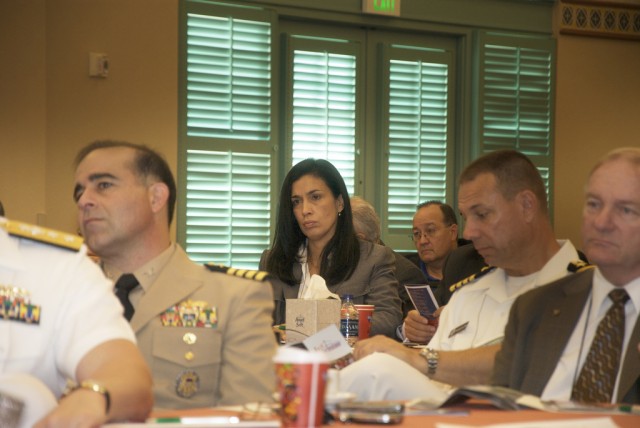ORLANDO, Fla. -- America must drastically improve science education in minority communities to remain a great country, senior leaders said at the 2010 Hispanic Engineer National Achievement Awards Conference.
Dr. Gerardo Melendez, director of the U.S. Army Armament Research, Development and Engineering Center, discussed his impressions after the Senior Executive Session. He said sparking minorities' interest in science at a young age is vital.
"Having an early engagement in the whole process is the way to do it," he said. "That's the right approach -- one in which you look at the whole pipeline of how you develop these future scientists and engineers.
"You don't position yourself at the end, where you take the output. Rather, you take a look at the whole process to shape and influence [minority students]."
About 75 leaders from the military, industry, federal government agencies, universities, and nonprofits gathered Oct. 8 to discuss initiatives for improving scientific achievement among young people.
The U.S. Army Research, Development and Engineering Command strongly supports science, technology, engineering and mathematics education outreach through several projects. One example is the Army's eCYBERMISSION, a STEM competition for middle school students.
Major Gen. Nick Justice, RDECOM commanding general, recognized the national winners during their week-long visit to Aberdeen Proving Ground, Md., in June. The program has awarded more than $800,000 to participants this year for their achievements.
"Just by being here you are already winners," Justice said June 28 during the awards dinner.
Ray Mellado, chairman and chief executive officer of Great Minds in STEM, encouraged participants to ensure America's future by maintaining its technical strength. He founded the organization in 1989 to improve access to education in STEM in underserved communities.
"How do we ensure our inner-city kids can learn about the awareness, the inspiration, the motivation, and the skills so they can be part of the world that we talked about today'" Mellado said.
Mellado talked about the results of recent studies by his organization. Two years determine the future of Hispanic and black students, he said.
If students complete algebra by eighth grade, their chances of graduating from high school and going to college is greater. They will have the foundation for succeeding in college and pursuing a STEM career. If they do not pass algebra by 10th grade, they may not graduate from high school, he said.
Justice said a comprehensive national plan is needed to achieve the conference's objectives.
"What we really need is national objectives and national efforts to measure our successes and to focus our achievements on," Justice said. "Government, industry and academic partnerships are exactly what we need to move the nation forward."
Justice said the Army has a strong history of technical innovation. He is confident that RDECOM's outreach programs and 9,500 scientists will help lead the challenge of converting today's students into tomorrow's leading researchers.
"We are focused on getting the engineering and science talent to move the Army forward," he said. "The Army has historically moved the nation forward.
"Finding those national goals and making sure we're aligned in support of those is going to be a tremendous opportunity for the U.S. Army Research, Development and Engineering Command."


Social Sharing